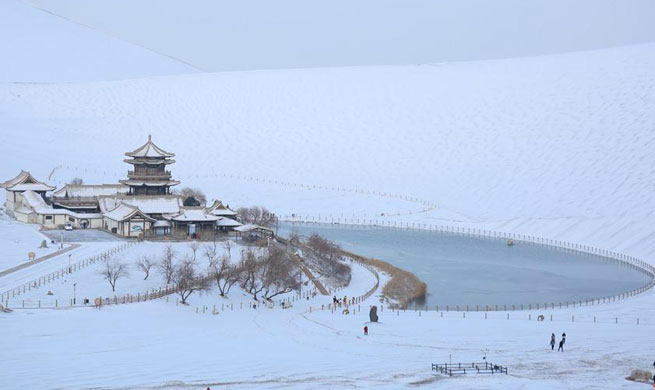by Jon Day
TOKYO, Dec. 29 (Xinhua) -- Japanese Prime Minister Shinzo Abe's year at the helm has seen him lean on his party's overwhelming majority in parliament to force into law publicly divisive legislation and dodge political scandals, in pursuit of his controversial goal of amending Japan's pacifist Constitution.
The 64-year-old leader of the ruling Liberal Democratic Party (LDP) spent the earlier part of the year dodging a number of political scandals involving government ministries, ruling party ministers, executives, aides and associates around him, as well as cries of cronyism levied at him personally.
POLITICAL IMPUNITY
Abe rode the storm of rising and falling public support, keeping his eyes fixed on winning the LDP presidential election.
"He has weathered the cronyism scandals and bizarrely prosecutors declined to prosecute bureaucrats for doctoring documents submitted to the Diet aimed at exonerating Abe," Jeffrey Kingston, director of Asia studies at Temple University's Japan campus, told Xinhua.
"Eighty percent of the public disbelieves Abe's self-exonerating explanations," Kingston added.
Other experts on the matter have pointed to a largely toothless opposition camp, that, owing to a lack of numbers and hence actual political clout, also lacks cohesiveness.
Shin Chiba, professor with Special Appointment at the International Christian University, told Xinhua that the public's fluctuating support for Abe and the LDP administration has much to do with a lack of viable alternatives."
"The Abe-led LDP administration has, in recent months, had the support of about 40 through 47 percent of the public in recent months. The main reason for this seems to be the weakness and the lack of reliability among the opposition parties," Chiba said.
LONGEVITY GRINDS
In late September, Abe won the ruling party's leadership election that will likely see him become Japan's longest-serving leader. But the process was perhaps not as smooth as Abe may have wished, with underwhelming support shown by rank-and-file party members.
The leadership race itself saw former Defense Minister Shigeru Ishiba as Abe's only opponent for the party's top spot. In the run-up to the election, Ishiba voiced markedly differing views to Abe on issues spanning constitutional reform and economic policies, and ended up mounting a far-bigger challenge to the incumbent than expected.
The underwhelming support in the leadership election, described by political watchers here as a "backlash" by the LDP's rank-and-file members, is "most certainly" reflected in public opinion, specialists in politics and national ideology maintained at the time.
Nevertheless, Abe, following his victory, was quick to reiterate his highly-divisive plans to forge ahead with revising the nation's supreme law for the first time since World War II.
Contradicting public and constitutional experts' opinions, the role of Japan's Self-Defense Forces (SDF) has been redefined three years ago to allow it to take part in collective self defense and come to the aid of an ally under attack, even if Japan's own territory is not threatened.
Abe's victory, however, failed to overly impress or enthuse the public, who has become apparently weary of an overbearing government and its bulldozing of contentious legislation over recent years.
"His (Abe's most) recent dip in popularity is due to the new migrant worker legislation he steamrolled through the Diet without proper or detailed explanations (to opposition parties and the public)," Kingston said.
"There is legitimate concern that the new law will subject foreign workers to abuses as has been the case with existing migrant workers. And because the law is so vague, much is left to bureaucratic discretion without legislative oversight and two-thirds of the public opposes the bill, not because they are xenophobic, but because of Abe's imperious ways," added Kingston.
FINAL SCENARIO
Since his victory in the party's election, Abe has been slowly seeking more debate on the contentious issue of revising the pacifist constitution. A two-thirds majority in both houses of parliament and a majority in a national referendum are needed to bring about the constitutional revision, which will specifically make reference to the SDF and "purportedly" clear up its current constitutional ambiguity.
"Currently public opinion is strongly against (constitutional) revision and pro-revision forces are divided on how and what should be revised," noted Kingston.
As debate on constitution revision has heated up prior to the year ending, Abe is facing a lack of support from not just the public, but the LDP's own Komeito junior coalition ally.
LDP's "key coalition partner Komeito has not participated in discussions on (constitutional) revisions and the upper house elections are due this summer, further clouding prospects," Kingston said.
But in the final scenario, it will be the Japanese public and not the LDP-forced legislation, as has been the case in the past, that will determine the course of Japan's future defense posture.
While maintaining that the "people in general are not happy with the LDP's long-term domination," Chiba said there is a great deal of reluctance among Japanese citizens to change the pacifist charter that for decades has ensured peace and trumpeted the virtues of forever renouncing war and not maintaining war potential means.
"I think that under the Abe administration the people are very reluctant and concerned about constitutional amendment," Chiba said.
"The right-wing government may excessively militarize Japan with the constitutional endorsement of the Self-Defense Forces. So it will certainly not be easy for the current administration to win the referendum to amend the constitution," Chiba added. Enditem



















